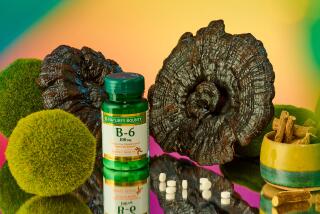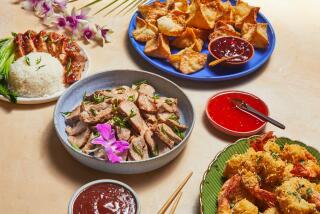Workers in Japan Like Tonic to Pack a Punch : Ingredients May Include Vitamins, Cobra Extract, Alcohol or Essence of Seal
- Share via
TOKYO — At the Energy Pool bar in the heart of Tokyo’s business district, office workers worn out by the daily grind are seeking a solution at the bottom of a bottle--a tonic bottle.
A fixture at drugstores and kiosks in commuter stations, tonics are the kick that refreshes the hard-working Japanese, famous for toiling long hours and shunning paid holidays.
Taking a tonic here is not like popping open a cola for breakfast or sneaking a nip at lunch in the United States. It’s more akin to taking your vitamins.
But it’s in fashion. And besides, some of the tonics are laced with alcohol, caffeine or nicotine derivatives--which makes them a whole lot easier to swallow.
Not Many Restrictions
Whether the drinks are regarded as soft, hard, or somewhere in between, depends on the kind of punch they pack. Some do contain vitamins, but none is seriously regarded as an antidote for what ails you--despite their advertising claims. And many contain enough stimulants to worry doctors that the drinks could become mildly addictive.
So how do they taste? Well, they vary. Popular now are some resembling non-sweetened cough syrup, or as one Westerner described them, Dr. Pepper without the fizz.
While the content of the drinks is regulated by the government, few restrictions have been placed on their sale. The strongest tonics are mostly sold in drugstores; drinks containing alcohol are required to say so on their labels.
The Energy Pool bar offers more than 180 varieties, ranging in price from 100 yen (80 cents) to 3,000 yen ($24) and containing such exotic ingredients as cobra extract or essence of seal.
Industry sources estimate that the market nationwide has swelled to nearly $1 billion, an increase of 13% from 1986. Over half that figure came from sales of tonics in tiny bottles of 50 milliliters (1.5 fluid ounces) or less, according to Takanori Fujimoto, spokesman for Takeda Chemical Industries, Japan’s largest drug maker.
Alinamin V, a vitamin B1 tonic introduced by Takeda Chemical in March, 1987, sold 10 million bottles its first year, Fujimoto said. “The response was much greater than we expected.”
Need for Refreshment
In developing Alinamin V, Takeda sought to imitate the success of Coca-Cola, originally a tonic derived from coca leaves, which revolutionized the beverage industry worldwide.
Tonic names often suggest medicinal qualities, while catchy advertising phrases make the drinks out to be something fit for a samurai warrior going into battle. “Can you fight for 24 hours?” asks a commercial for Regain, a drink introduced in April.
Many workers may be asking themselves the same question. In Japan, where workers averaged 2,150 work hours for 1986--compared with 1,924 in the United States and 1,655 in West Germany--six-day work weeks are common.
Over 80% of 400 Tokyo businessmen polled by the Fukoku Life Insurance Co. in February were found to suffer work-related fatigue. Though most said they battled the blahs with sleep, baths or alcohol, vitamin and tonic drinks were mentioned by over 25%--more than exercise, a healthy diet and sick leave combined.
Why tonics? Takeda Chemical’s Fujimoto said the current boom in tonic sales reflects a break with the past.
“People now buy the drinks before they get tired, as a kind of preventive action,” Fujimoto said. And, though men over the age of 50 have traditionally made up the bulk of the market, “Sales are way up among young office workers, particularly women.”
Miyako Nakanishi, pharmacist and manager of the Energy Pool, said tonics claim to cure or alleviate a long list of white-collar woes--stomachaches and poor appetite caused by stress, minor colds brought on by lack of exercise, or hangovers from bouts of work-related socializing.
But, according to Nakanishi, the immediate boost from tonics is what brings in the customers.
“Most of our customers are after instant energy,” she said.
May Be Habit-Forming
As sales grow, however, so do concerns that the drinks may not be as healthy as their makers claim. Takashi Higuchi, a physiologist at Fukui Medical College, said the tonics may be good for their vitamin content, but he wouldn’t recommend them highly to sufferers of fatigue or anything else.
Nakanishi admitted the drinks may be habit-forming, but, added: “They’re safe, if consumption is limited to one bottle a day. Recently some customers have asked specifically for drinks that don’t contain alcohol or caffeine, but most aren’t concerned with long-term effects.”
After all, most tonic drinkers are lured by the mystique, not the ingredients.
“Businessmen work long hours; they’re tired,” said Hisako Yoshizawa, a commentator often quoted by Japanese media. “Often they don’t eat breakfast and they don’t care, really, what the drinks contain.”
More to Read
Eat your way across L.A.
Get our weekly Tasting Notes newsletter for reviews, news and more.
You may occasionally receive promotional content from the Los Angeles Times.










